


Automattic and WordPress Foundation accuse hosting provider of systematic brand exploitation following Silver Lake acquisition.
In a forceful legal response filed October 23, 2025, Automattic, WordPress Foundation, WooCommerce, and WordPress co-founder Matt Mullenweg have launched extensive counterclaims against WP Engine. They allege years of deliberate trademark infringement and consumer deception that intensified dramatically after private equity firm Silver Lake's 2018 acquisition of the hosting company.
The 162-page counterclaim paints a detailed picture of what the WordPress parties describe as WP Engine's calculated strategy to "inflate its valuation and mask its problems" by systematically misappropriating the WordPress and WooCommerce trademarks, transforming from a hosting provider making modest, legitimate references to the WordPress software into what they characterize as a company posing as an official WordPress entity.
The counterclaims, filed in the U.S. District Court for the Northern District of California, accuse WP Engine of federal and common law trademark infringement, trademark dilution, false advertising, and unfair competition. Central to the WordPress parties' case is the assertion that WP Engine crossed the line from permissible nominative use, simply referencing WordPress software in describing their services, to outright brand appropriation.
"WP Engine is not a victim. It is a serial infringer that engaged in trademark theft, false advertising, and deceptive business practices to inflate its valuation and mask its problems," the counterclaim states in its introduction.
According to the filing, WP Engine's trademark usage remained relatively modest from its 2010 founding through early 2018. However, following Silver Lake's $250 million acquisition that year, the company's use of WordPress and WooCommerce marks allegedly increased dramatically.
The counterclaims include detailed charts showing WP Engine's use of the "WordPress" mark on its homepage skyrocketed from approximately 20 visible instances in 2017 to over 160 by 2023, a more than 700% increase. The total jumped from around 80 cases to nearly 350 when including non-visible uses for search engine optimization.
Most tellingly, the WordPress parties compare WP Engine's usage to competitors offering similar WordPress hosting services. The data shows WP Engine using the WordPress mark far more frequently than companies like Bluehost, SiteGround, or GoDaddy, suggesting the usage went well beyond what's necessary to describe WordPress-compatible services.
The counterclaims detail what they characterize as WP Engine's progression from accurately describing their services to actively impersonating WordPress itself:
Early Years (2010-2017): WP Engine used descriptive language like "WordPress hosting" to explain its services, which the WordPress parties suggest was largely appropriate.
Post-Acquisition Transformation (2018-2024): WP Engine allegedly rebranded itself as:
Perhaps most problematically, in 2021, WP Engine began incorporating "WordPress" directly into product names, launching "Headless WordPress," "Core WordPress," "Essential WordPress," and "Enterprise WordPress" plans. This violates the WordPress Foundation's longstanding trademark policy prohibiting "WordPress" in product names.
The term "Core WordPress" proved particularly controversial, as "Core" refers explicitly to the foundational open-source software available at WordPress.org, not commercial hosting services.
The counterclaims present extensive evidence of actual consumer confusion, including:
Misdirected support requests: Dozens of examples of WP Engine customers contacting WordPress.com or Automattic support, believing they were the same company
Billing confusion: Customers asking WordPress.com to resolve WP Engine billing disputes or cancel WP Engine subscriptions
Technical support mix-ups: A notable incident where a frustrated WP Engine customer experiencing an outage added Matt Mullenweg and Automattic employees to their support ticket seeking "urgent support," not realizing they were separate companies
Name confusion: Widespread use of "WordPress Engine" instead of "WP Engine" by customers and even WP Engine's own agency partners
Corporate confusion: Enterprise customers, including Fortune 500 companies, are expressing uncertainty about whether WP Engine is affiliated with WordPress
In one striking example in the filing, a WP Engine customer emailed WordPress.com security in July 2025, asking directly: "Are you a separate entity from WP Engine? I've been a customer [sic] of WP Engine for years... but always thought you all were the same."
Beyond trademark infringement, the counterclaims accuse WP Engine of falsely promoting its contributions to the WordPress open-source project through the "Five for the Future" initiative, a pledge introduced by Mullenweg, encouraging companies benefiting from WordPress to contribute 5% of their resources back to the project.
The filing alleges WP Engine:
By contrast, Automattic had 109 contributors contributing 3,969 hours per week as of June 2024, more than 300 times WP Engine's current pledge.
The counterclaims detail how WP Engine allegedly uses the WordPress and WooCommerce trademarks as part of a sophisticated search engine optimization strategy. When users search for "WordPress hosting" or "WooCommerce," WP Engine's paid advertisements frequently appear as the top result, even on WordPress.com.
For months, WP Engine's Google search listing displayed as "WP Engine: Most Trusted WordPress® Platform 2025" with the registered trademark symbol, creating what the WordPress parties argue is a false impression that WP Engine owns the WordPress trademark or is an officially sanctioned provider.
The counterclaims reveal that Automattic spent months attempting to resolve the trademark issues through good-faith negotiations, beginning in late 2023:
February-March 2024: Automattic representatives met with WP Engine to discuss trademark licensing and a potential WooCommerce partnership
May 2024: Automattic shared a proposed term sheet seeking $5 million annually for trademark licensing
June-July 2024: Discussions continued with WP Engine, appearing "noncommittal" and attempting to delay
July 2024: Automattic warned that without an executed agreement by September, enforcement action would be necessary
September 20, 2024: Automattic made a final proposal offering either a royalty fee or fulfillment of Five for the Future commitments
Despite these extensive negotiations, WP Engine CEO Heather Brunner and Silver Lake board member Lee Wittlinger allegedly "feigned surprise" at the trademark license concept in September, even though it had been "the very first commercial term of the May term sheet" and discussed repeatedly over preceding months.
Eight days after Automattic's formal cease-and-desist letter, WP Engine filed its lawsuit against Automattic and Mullenweg.
In what the WordPress parties characterize as a tacit admission of infringement, WP Engine allegedly scrubbed its most egregious trademark uses in the days immediately before filing its lawsuit seeking a declaration of non-infringement:
"WP Engine's conduct is a tacit admission that describing its services as 'creat[ing] on WordPress' was infringing," the counterclaim argues.
However, the filing notes that WP Engine has since restored many of these uses, continues to market itself as "the WordPress Technology Company," and extensively uses both trademarks on its website and advertising.
Throughout the counterclaims, the WordPress parties repeatedly point to Silver Lake's ownership as the driving force behind WP Engine's allegedly infringing conduct. They suggest the private equity firm's inability to achieve its desired return on the $250 million investment led to increasingly aggressively exploiting the WordPress brand.
"On information and belief, around late 2023, Silver Lake began preparing to sell WP Engine to recoup its poor investment," the counterclaim states, noting that Silver Lake "hired bankers and attempted to sell WP Engine for over $2 billion into 2024, but no buyer was willing to entertain the price."
The filing alleges WP Engine's trademark infringement intensified as part of a strategy to "inflate WP Engine's attractiveness to a potential buyer" through cost-cutting measures and "dramatically increasing the perception that WP Engine is connected to, sponsored by, or affiliated with" the WordPress parties.
The counterclaims assert seven causes of action:
The WordPress parties seek:
Beyond the legal technicalities, the counterclaims frame WP Engine's conduct as a threat to the fundamental principles underlying the WordPress open-source project.
"This case is about more than trademarks," the filing states. "It is about protecting a free and open internet that benefits everyone. It is about exposing a threat to this balanced ecosystem by holding WP Engine accountable for a deliberate, unlawful scheme that threatens its very foundation."
The WordPress parties argue that in an open-source ecosystem where the code is freely available under the GPL license, trademarks serve as the primary and sometimes only mechanism to ensure users know they're interacting with authentic, quality-controlled software and services aligned with the project's values.
"Because the WordPress software is released under a permissive license that allows anyone to use, modify, and distribute it freely, the WordPress Parties cannot control who uses the code, nor do they want to," the counterclaim explains. "But they can control who makes commercial use of the name."
The counterclaims provide important context often missing from public discussions of the WordPress/WP Engine dispute:
WordPress is genuinely famous: The filing documents WordPress's reach across hundreds of millions of websites, extensive media coverage (28,369 articles mentioning WordPress found in a Lexis search), and recognition even among general consumers. WP Engine has called WordPress "the dominant content management system" that's "running the internet."
The trademark policy has been clear and consistent: Since the WordPress Foundation's 2010 trademark policy, the rules have explicitly prohibited for-profit companies from using "WordPress" in product, service, or company names, or in ways suggesting affiliation or endorsement. The policy has remained essentially unchanged for 15 years.
Automattic competes but also contributes massively: While Automattic offers competing WordPress hosting through WordPress.com, it has historically contributed thousands of hours weekly to the open-source project (3,969 hours from 109 contributors as of June 2024) and provides essential infrastructure, event coordination, and long-term project stewardship that goes far beyond code contribution.
Other hosts generally comply: The filing notes that most WordPress hosting competitors "generally adhere to the WordPress Foundation's trademark policy," with none approaching "the nature, scope, or scale of WP Engine's sustained and deliberate efforts to create confusion."
The counterclaims dramatically expand the scope of the legal battle initiated by WP Engine's original lawsuit. While WP Engine sued seeking declarations that it hasn't infringed WordPress trademarks and alleging anticompetitive conduct, the WordPress parties have now put WP Engine's entire business model and branding strategy at the center of the dispute.
The case will likely hinge on key questions:
With both sides having asserted extensive claims, the discovery process promises to reveal internal documents about WP Engine's branding strategy, Silver Lake's sale efforts, actual financial impact, and consumer confusion.
For the broader WordPress community, the case raises fundamental questions about protecting open-source brands while maintaining the ecosystem's openness and what happens when massive financial incentives collide with the collaborative ethos that built the world's most popular content management system.
The WordPress parties have made their position clear: WP Engine crossed the line from community participant to brand appropriator, and protecting the WordPress trademark isn't about limiting competition; it's about ensuring users know who they're dealing with when they see the WordPress name.

"*" indicates required fields

"*" indicates required fields

"*" indicates required fields